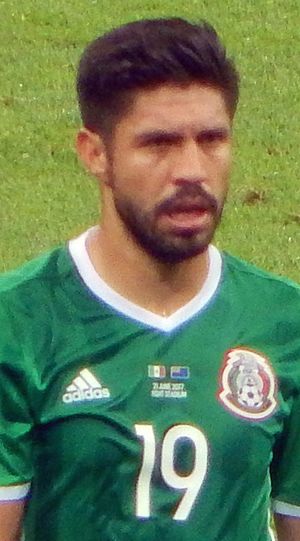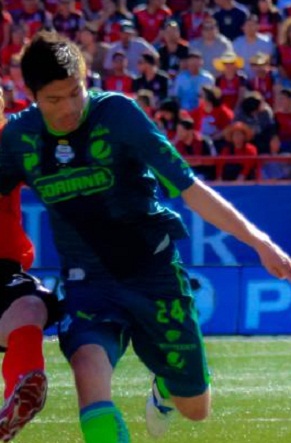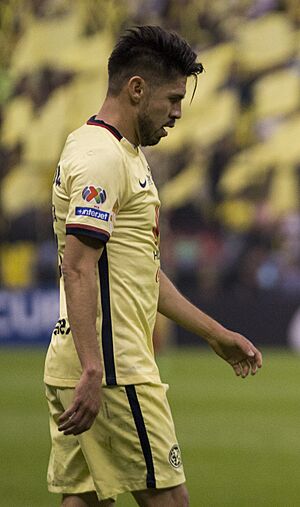Oribe Peralta facts for kids

Peralta with Mexico at the 2017 FIFA Confederations Cup
|
||||||||||||||||||||||||||||
| Personal information | ||||||||||||||||||||||||||||
|---|---|---|---|---|---|---|---|---|---|---|---|---|---|---|---|---|---|---|---|---|---|---|---|---|---|---|---|---|
| Full name | Oribe Peralta Morones | |||||||||||||||||||||||||||
| Date of birth | 12 January 1984 | |||||||||||||||||||||||||||
| Place of birth | Torreón, Coahuila, Mexico | |||||||||||||||||||||||||||
| Height | 1.78 m (5 ft 10 in) | |||||||||||||||||||||||||||
| Position(s) | Forward | |||||||||||||||||||||||||||
| Youth career | ||||||||||||||||||||||||||||
| Alacranes de Durango | ||||||||||||||||||||||||||||
| 2002 | Guadalajara | |||||||||||||||||||||||||||
| Senior career* | ||||||||||||||||||||||||||||
| Years | Team | Apps | (Gls) | |||||||||||||||||||||||||
| 2003 | Morelia | 2 | (0) | |||||||||||||||||||||||||
| 2003–2004 | León | 33 | (10) | |||||||||||||||||||||||||
| 2005–2006 | Monterrey 1a. A | 15 | (7) | |||||||||||||||||||||||||
| 2004–2006 | Monterrey | 64 | (11) | |||||||||||||||||||||||||
| 2005 | → Guadalajara (loan) | 0 | (0) | |||||||||||||||||||||||||
| 2005 | Santos Laguna 1a. 'A' | 6 | (2) | |||||||||||||||||||||||||
| 2006–2014 | Santos Laguna | 223 | (82) | |||||||||||||||||||||||||
| 2008–2009 | → Chiapas (loan) | 35 | (12) | |||||||||||||||||||||||||
| 2014–2019 | América | 182 | (60) | |||||||||||||||||||||||||
| 2019–2021 | Guadalajara | 33 | (1) | |||||||||||||||||||||||||
| Total | 594 | (186) | ||||||||||||||||||||||||||
| International career | ||||||||||||||||||||||||||||
| 2011–2012 | Mexico Olympic (O.P.) | 11 | (10) | |||||||||||||||||||||||||
| 2016 | Mexico Olympic (O.P.) | 2 | (1) | |||||||||||||||||||||||||
| 2005–2018 | Mexico | 67 | (26) | |||||||||||||||||||||||||
|
Medal record
|
||||||||||||||||||||||||||||
| *Club domestic league appearances and goals | ||||||||||||||||||||||||||||
Oribe Peralta Morones (born January 12, 1984) is a famous Mexican former professional footballer. He played as a forward, which means he was usually trying to score goals. He is especially known for winning an Olympic gold medal with Mexico's football team.
Peralta started his professional career with Morelia in 2003. He then played for several other teams like León, Monterrey, and Guadalajara. He became a key player for Santos Laguna, where he played over 200 games and scored 97 goals. In 2014, Peralta moved to Club América in a record-breaking transfer for Mexican football at the time. He later returned to Guadalajara before ending his professional career in January 2022.
Oribe Peralta also played for the Mexican national team. He helped the under-22 squad win the 2011 Pan American Games. He scored two important goals in the gold medal match at the 2012 Olympic football tournament against Brazil, which was a historic first Olympic gold medal for Mexico in football. He also played in major tournaments like the 2015 CONCACAF Gold Cup, Copa America Centenario, 2017 FIFA Confederations Cup, and the 2014 and 2018 FIFA World Cup. He stopped playing for the national team after the 2018 World Cup.
Peralta's impressive career includes winning four Liga MX titles, two CONCACAF Champions Cup titles, a CONCACAF Gold Cup, and that special Olympic gold medal.
Contents
Early Life and First Steps in Football
Oribe Peralta was born in a small town called La Partida, close to Torreón, Coahuila, Mexico. He was the oldest of four brothers. His parents were Miguel Ángel Peralta and Julieta Morones.
How Did Oribe Peralta Start Playing Football?
When he was 13, Peralta joined his first football team, called Los Vagos, in his hometown. In 1998, while in high school, he played for La Partida's official town team against other towns in Torreon. He faced a big challenge when he broke his tibia and fibula, which meant he couldn't move for a whole year.
Overcoming Challenges to Play Professionally
After many months of getting better, Peralta managed to join CESIFUT (Synergy Center of Football). He then caught the eye of Alacranes de Durango, a professional team. The head coach of C.D. Guadalajara, Oscar Ruggeri, invited him for a tryout. Later, he received an invitation from Monarcas Morelia, where manager Rubén Omar Romano gave him his first chance to play in a professional match.
Oribe Peralta's Club Career Highlights
Oribe Peralta played for many different football clubs throughout his career. Each club helped him grow as a player.
Morelia: His First Professional Team
Peralta made his first league appearance for Monarcas Morelia on February 22, 2003. He came into the game as a substitute against Club América. He played one more match that season but didn't get much playing time after that.
Playing for León and Monterrey
After Morelia, Peralta moved to León in the second division. He played 33 games and scored 10 goals, helping the club win a tournament in 2004. Next, he joined Monterrey for two seasons. He scored his first top-division goal for Monterrey and helped them reach the final in his first season.
Loan to Guadalajara
In 2005, Monterrey loaned Peralta to Guadalajara to help them in the 2005 Copa Libertadores tournament. He played in four matches during this loan spell.
Success with Santos Laguna
In 2006, Peralta joined Santos Laguna. He scored his first goal for the club against his old team, Monterrey. He had a great first season, scoring 9 goals in 17 matches and providing 7 assists.
Loan to Chiapas
In 2009, Peralta was loaned to Jaguares for a year. This was a very successful time for him, as he scored 12 goals in 35 games.
Returning to Santos Laguna and Becoming a Star
After his loan, Peralta returned to Santos Laguna in 2010. He became the team's main striker. During his time there, he scored 82 goals in 225 games. He helped Santos win the Clausura championships in 2008 and 2012. He also helped his team reach the finals of the CONCACAF Champions League twice. In 2013, he was named the CONCACAF Player of the Year because of his amazing performance. He was also the top scorer in the 2011–12 CONCACAF Champions League with 7 goals. Peralta played his last game for Santos Laguna on May 10, 2014.
Joining Club América
On May 13, 2014, Peralta was sold to Club América. This was a very big deal at the time, as it was reported that América paid US$10 million for him, making it the most expensive transfer in Mexican football history.
Peralta made his debut for América on July 19, 2014. He scored his first goal for the club on August 2. On December 14, he helped América win the league title by scoring a goal in the final against Tigres UANL.
In 2016, Peralta scored his first hat-trick (three goals in one game) for América against Toluca. He also returned from an injury he got at the Olympics to score a key goal in a comeback win against Cruz Azul. Before the 2017 Clausura tournament, Peralta became the team captain. He scored 50 league goals for Club América by September 2017. On May 26, 2018, Oribe Peralta won his second Liga MX title with Club América.
Returning to Guadalajara and Retirement
In 2019, Peralta returned to Guadalajara, which caused some talk because he was coming from their rivals, Club América. He signed a two-year contract. On October 1, he scored his first goal back with Guadalajara in a Copa MX match. On January 31, 2020, Peralta scored what would be his final goal as a professional football player.
On January 12, 2022, Oribe Peralta announced that he was retiring from professional football.
Oribe Peralta's International Career
Oribe Peralta also had a very successful career playing for Mexico's national teams.
Youth National Teams: Pan American and Olympic Gold
In 2011, Peralta was chosen to play for Mexico's under-22 team at the 2011 Pan American Games. He was one of the older players allowed to join the youth squad. Mexico won the gold medal, and Peralta was the top scorer of the tournament with six goals. He scored a hat-trick against Costa Rica to help his team reach the final, which Mexico won.
Winning Olympic Gold in 2012
Peralta was again chosen as one of the older players for the 2012 Summer Olympics in London. He played in all of Mexico's matches. In the semi-final against Japan, he scored a goal that helped Mexico win 3-1 and reach the final. In the gold-medal match against Brazil, Peralta scored the first goal just 29 seconds into the game, making it the fastest goal in an Olympic final! He scored a second goal later, and Mexico won 2-1, earning their first-ever Olympic gold medal in football. He was Mexico's top scorer in the tournament with four goals.
2016 Summer Olympics
Peralta was also part of the 2016 Summer Olympics team in Rio de Janeiro. He was named captain and scored Mexico's first goal in their opening match against Germany. Unfortunately, he had to leave the tournament early after breaking his nose in a match against Fiji.
Senior National Team Career
Peralta made his debut for the senior Mexican team in 2005. He started getting called up more regularly from 2011. On August 10, 2011, he scored his first goal for Mexico against the United States.
Playing in the FIFA World Cup
Peralta was chosen for Mexico's team for the 2014 FIFA World Cup. He scored the only goal in Mexico's first match against Cameroon, helping them win 1-0. In 2015, he scored a hat-trick during Mexico's opening match of the 2015 CONCACAF Gold Cup against Cuba. He also scored in the final, which Mexico won against Jamaica. After being chosen for the 2018 FIFA World Cup team, Peralta announced he would retire from the national team after the competition.
Oribe Peralta's Playing Style
Peralta was known as a "late bloomer," meaning he became a top player a bit later in his career. He was good at shooting from both close up and far away. He was also excellent at heading the ball and could make great passes to his teammates.
Personal Life
Oribe Peralta is a devoted Catholic. In 2017, he helped create the Asociación Mexicana de Futbolistas (Mexican Footballers Association) and served as its co-president.
Sponsorships
Peralta was sponsored by the German sportswear company Puma. He appeared in many advertisements for them, including for their new line of football boots used during the 2014 FIFA World Cup.
Oribe Peralta's Awards and Honours
Oribe Peralta won many awards and titles during his football career:
León
- Primera División A: Clausura 2004
Santos Laguna
- Mexican Primera División: Clausura 2008, Clausura 2012
América
- Liga MX: Apertura 2014, Apertura 2018
- Copa MX: Clausura 2019
- CONCACAF Champions League: 2014–15, 2015–16
- FIFA Club World Cup fourth place: 2016
Mexico Olympic Team
- Pan American Games: 2011 (Gold Medal)
- Olympic Gold Medal: 2012
Mexico Senior Team
- CONCACAF Gold Cup: 2015
- CONCACAF Cup: 2015
Individual Awards
- Pan American Games Golden Boot: 2011
- Mexican Primera División Best Forward: Apertura 2011, Clausura 2012
- Mexican Primera División Golden Ball: Clausura 2012
- CONCACAF Champions League Golden Ball: 2011–12
- CONCACAF Champions League Golden Boot: 2014–15 (shared)
- CONCACAF Player of the Year: 2013
Images for kids
See also
 In Spanish: Oribe Peralta para niños
In Spanish: Oribe Peralta para niños







